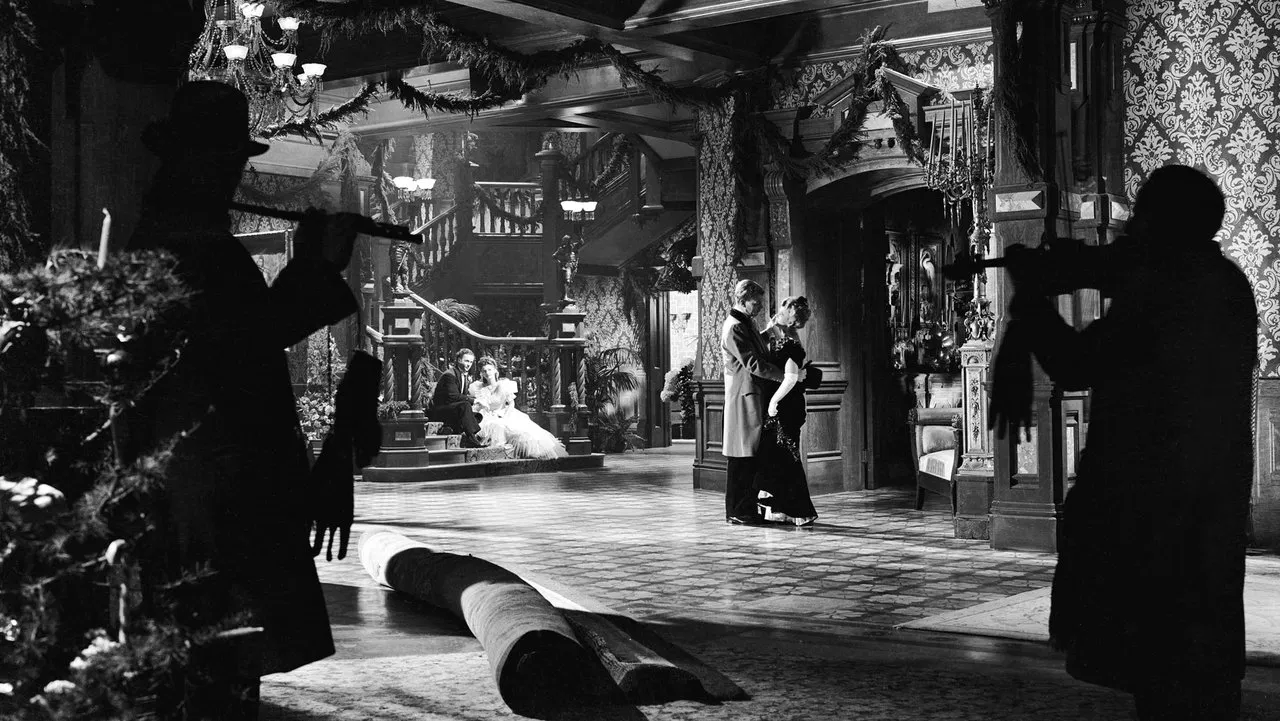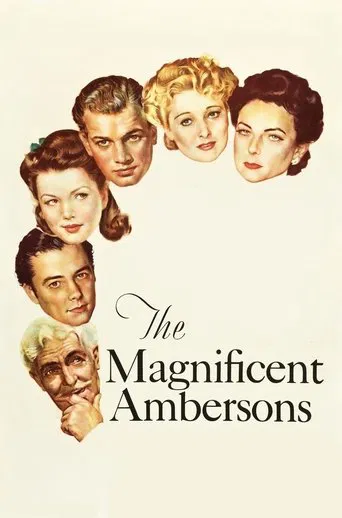

Booth Tarkington often wrote of boyhood in Indiana. The 1950 and 1951 musicals ON MOONLIGHT BAY and BY THE LIGHT OF THE SILVERY MOON are supposed toinclude anecdotes of his childhood. This film is drama not comedy as are the other two is avaialbe today in a shortened allegedly 88 minute cut not appoved by diector Orson Wells yet the storyboard of the effect a spoiled rotten son who destroys not as in the musicals merely annoys his family is well cast, edited, photographed and directed. Wesley in the two musicals grows up and his family moves on. George in this drama negatively effects his family who separates just when in his adult life he might need them the most. What is edited into the final cut is brilliant and thought provoking though many movie fans would rather it include what the the studio cut after Orson Wells fully prepared it for distribution.
... View MoreOrson Welles thought his version of The Magnificent Ambersons could had eclipsed Citizen Kane. What we have is a condensed film edited by RKO pictures who got rid off the negatives.The film has an interesting opening by Joseph Cotten which is also the engine of this film, change through the years and how it affects one small town. Cotten's Eugene Morgan becomes wealthy over time because of the automobile.The wealthy Ambersons become poorer due to bad investments, spoilt George Minafer (Tim Holt) behaves badly to those around him thinking his family inheritance will always be there.However despite gaining wealth Eugene Morgan never manages to spark his relationship with George's mother the widowed Isabel Amberson mainly due to George sabotaging the relationship.Welles as director is still experimenting with the art of film, the way scenes are shots, even the closing credits are narrated. The film is rather pacy due to the interference by the film studio.
... View MoreOn the most superficial level it is simply a story of living a life of regret caused by one woman's (Delores Costello as Isabel Amberson) inability to forgive a breach of etiquette by the guy she really loved (Joseph Cotten as Eugene Morgan) - one night he serenaded her while drunk and made a comical spectacle of himself. Out of spite she marries milquetoast Wilbur Minafer whom she does not love, and as predicted by one of the town gossips, raises an insufferable spoiled rotten child - George Minafer. The reason he is spoiled? Because Isabel can't love Wilbur, so she pours her love into her only child.On a deeper level it is about the changing times from the 19th to the 20th century and how that affects a small town in middle America. The Ambersons go from being a very prominent family to being displaced by the changing times and changing culture.The Amberson family serves as a metaphor for old money and old society, the closest thing America has to "royalty." Major Amberson, the patriarch of the Amberson clan, made the family fortune as a land developer and apparently as the founding father of the town. Eugene Morgan represents "new money," his family is from "the working class", his power and wealth comes not from "old" family connections but through financial dealings and modern manufacturing e.g. the automobile. Eugene looks toward the future, sees the changes in society and seizes the opportunities presented. The Ambersons are just happy to keep things as they are, they don't want to look at all of these "new-fangled" changes in society because if they did, THEY'D have to change. Because Georgie Amberson Minafer, the spoiled and arrogant grandson, absolutely refuses to accept any change whatsoever, he descends from the Midwestern aristocracy to the working class. He also takes away his mother's second chance at happiness at midlife when the widowed Eugene and the widow Isabel want to marry. Isabel could have acted against her grown son's demands, but, again, she was unable to change. She had let Georgie have his way his whole life and now she would let him swallow her life too. I'm not quite sure why someone as young as Georgie is so rigid and conventional. It may be because change requires work and thought - two qualities that young Georgie definitely shys away from. His arrogance and his sense of entitlement are why so many of the townspeople and so many viewers cannot wait for him to get his "comeuppance". Unfortunately for all of us, by the time he does, it only registers perhaps on him."Something had happened. A thing which, years ago, had been the most eager hope of many, many good citizens of the town, and now it had come at last; George Amberson Minafer had got his comeuppance. He got it three times filled, and running over. But those who had so longed for it were not there to see it, and they never knew it. Those who were still living had forgotten all about it and all about him. "Well, if you watch the film, which gives you a voyeur's view of a story, you really see none of this comeuppance, none of George's transformation, which is talked about in the final scene that has Eugene and Aunt Fanny talking about it, but no George! Well there is a reason for this. Orson Welles was in South America when RKO was editing this film. They cut 40 minutes of what Welles had shot and tacked on the George-less ending. Why? They claimed it was because test audiences were "repulsed" by Aunt Fanny! The great Agnes Morehead is playing Fanny as your typical maiden aunt character, frustrated because the man she always loved never even noticed her, but she plays the part with great humanity, so that has to be a bogus excuse. I'll always believe it was because Welles challenged the status quo of the business elite in Citizen Kane, and was doing it once again in this film a year later, even though it was adapted from a novel. Perhaps with a war just starting and the production code nipping at their heels RKO just didn't want to seem anti-establishment and by extension anti-American.I'd still recommend it. It is well acted, well directed and has some great individual scenes even in its skewered state. At the very least it is a well told great romantic tragedy for all of the main characters.
... View MoreExtremely successful family drama and adaptation based on the novel. Welles showed an excellent sense of drama. THE MAGNIFICENT AMBERSONS are grandiose and magic. Ordinary people in the aristocratic way experiencing the most ordinary adversity. Once poor Eugene Morgan (Joseph Cotten), who made his fortune producing cars, is trying to impose the traditional aristocracy. On his way he was blocking with moral barriers in the form of a young and spoiled George Amberson (Tim Holt).The story of Ambersonovima, a prominent and wealthy family of the then small city of Indianapolis, begins in 1873, at a time when life was much slower and when you have time for everything. This is a kind of dawn on the Industrial Revolution, a time in which materialism rule the country and the time to become money. It's hard to resist the impression that this is a somber drama. In one human story is born a new era. Maybe a little too ambitious. As a result, witnessed various changes and shortening.Director in the role of narrator introduces us to the magic and seamless switching to the characterization of the characters. Tim Holt as George is the embodiment of the requested malice and misunderstanding. Dolores Costello as Isabel is incredibly beautiful and attractive mother. A woman who is mature leaves the strongest emotion. I'm stunned because I Costello first saw in this film. Agnes Moorehead as Fanny in the role of the romantic and deeply frustrated aunt is great. Joseph Cotten as Eugene in good and surprisingly limited role.Magnificent Ambersons is a very good movie that captures the director's style, impressive scenery and great working with the cast, and has a strange manpower.
... View More